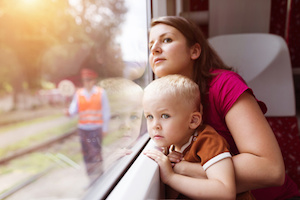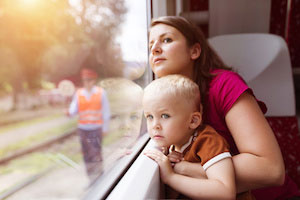 Have you ever seen people’s faces when you show up on a plane or in a restaurant with small children? There is often an involuntary shudder and a pursing of lips. People see small children and think noise, or tantrums, or mess and fuss.
Have you ever seen people’s faces when you show up on a plane or in a restaurant with small children? There is often an involuntary shudder and a pursing of lips. People see small children and think noise, or tantrums, or mess and fuss.
This needn’t be the case. With careful planning and a bit of creativity, there’s no reason why children shouldn’t be happy little travellers.
Keep them comfortable and entertained
Nobody, no matter what their age, likes to be hungry, tired, bored or uncomfortable. Adults may (!) learn to hide it better, but children are not often so subtle. Pack them their own travel bag that contains everything they need to stay comfortable and occupied while you travel or eat out.
Small bags with wheels are a good idea – not only do they feel grown up, kids are also far more likely to be responsible for a ‘wheelie bag’ throughout the whole trip.
If you have space in your carry-on luggage, keep a few treats and games tucked away, in case they are tempted to finish every activity before you are barely on your way.
Devices such as tablets and mobile phones are excellent babysitters, but they run out of battery and do tend to overstimulate children, so keep them with you and use the timer function so you both know how long they have been playing for. Pack headphones so any games with loud or repetitive sounds don’t disturb other travellers.
Colouring in, dot to dots and puzzle books keep kids occupied really well. For slightly older children, set them tasks – drawing the interior of the plane/train or automobile you are in, translating any signs in other languages, writing a diary of their experiences (one sentence per hour). Books (either with real pages or on a kindle) never go astray.
Once an hour play Eye Spy or Cloud Shapes or Car Cricket to give them some constructive attention.
Pack a variety of small, interesting snacks. Packets of snacks are extremely convenient, but just watch that they aren’t too full of sugar or salt, or you could end up with a somewhat manic, or very thirsty little person. Anything they don’t eat may need to be thrown away at the end of your trip, so don’t take large amounts, but it is valuable to be able to provide snacks when they are needed.
Keep them well hydrated with their own sipper bottle. If you are travelling on a plane, you may need to fill this once you clear customs), due to liquid restrictions.
You know your own child. Explain what is going to happen and that they will need to be more patient than usual. Pre-empt things like emergency toilet trips by taking them before you start a long journey, and don’t wait until they ask to go on a plane (where there may be a line).
Encourage sleep and prepare for motion sickness. You may like to ask your pharmacist or GP for effective remedies before you leave (including natural sleep enhancers).
Dress them in comfortable clothing and have a spare set nearby, always, along with baby wipes and sticking plasters. A neck pillow is a great idea for kids – a tired child is an unreasonable child, and we all know how hard it can be to sleep when your head is bobbing around. Not all bus and plane seats are particularly comfortable for little people.
If your wee one will find it hard to walk and stand for long periods of time, pack a foldable stroller. You will need your hands while you are travelling, it is not practical to carry children when you are producing documents or paying for things.
Keep them safe
Much as it is unlikely, talk to your child about staying with you (as opposed to going with strangers). It is a hard conversation to have, because nobody wants to scare children. If they ever find themselves in a situation that they are uncomfortable with, teach them to say loudly and assertively, “you are not my Mummy/Daddy” (“Help” can seem too confrontational for children sometimes).
Write your name and phone number in strong ink on their land or inner arm if you are going to be in large crowds of people. Children do lag behind or wander off occasionally and most people will go out of their way to help them. If they feel stressed or lost, your child may freeze up and forget your phone number, so it is a good idea to have it written on them. If you are in a county where language is a barrier, this is doubly important. Teach them to stay put if they find themselves lost.
Children are risk takers. Make sure you are well protected in case of illness or injury. Ask you travel insurance provider to make sure you are well covered in case of emergency.
Be patient
The beauty of offering your children new experiences is that they will usually rise to the challenge. Keep their routine as predictable as possible and avoid travelling or eating when you know it is a tricky time for them. New experiences can be over-stimulating, even when they are having fun, so allow plenty of time for rest. Explain what is going on so they are well informed and always remember, they aren’t small adults, they are children. They need to feel secure. Big changes can throw them, so be extra patient.









Join the Discussion
Type out your comment here:
You must be logged in to post a comment.